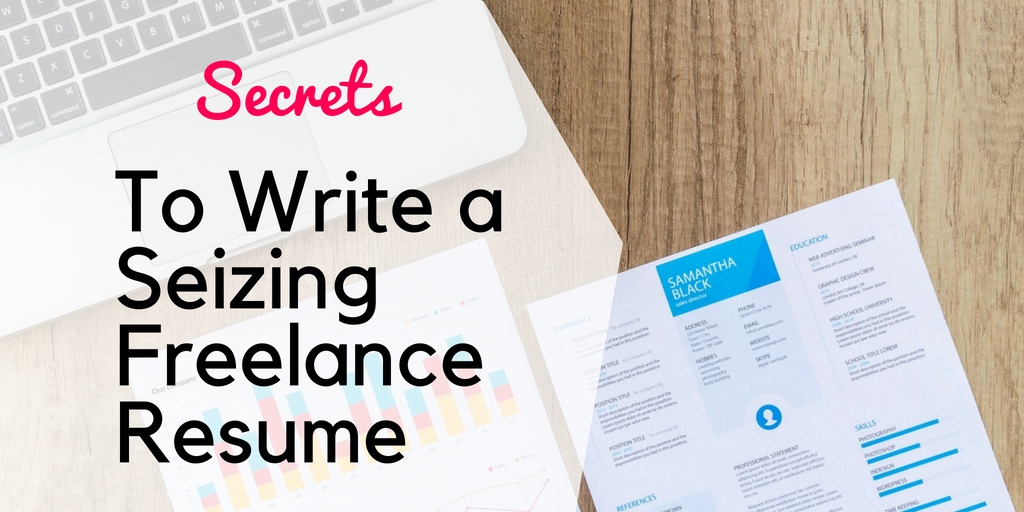
A freelancer’s life: search for new jobs or gigs every other day. The resume of a freelancer plays a vital role throughout his career. However, most independent consultants use their resumes the same way full-time job seekers do. Today, we shall talk about how to write a great freelance resume, combine your pitch with it and then land jobs that are usually beyond your reach.
The Resume of a Freelance is Beyond Representation..
This is because, as a freelancer, you would have worked at a series of jobs or companies and in fact built your own business from scratch. You won’t be able to fit all your gigs or accomplishments on a sheet of paper. So, what can you do? Here’s what you should focus on:
Style of the Resume
You can choose one of the two resume writing options. However, you have to keep in mind that most clients prefer ‘traditional’ resume formats. So, keep it simple.
Option 1: Functional Resume
List your top best skills in order (4 – 10) and name the projects/title completed against that skill.
Example: Content Marketing (skill) –developed interactive Facebook captions and generated 1000 views on the website within a month.
Option 2: Chronological Resume
List your work history in chronological order, with recent work experience mentioned first.
For freelancers, we suggest going with option 1 as employers here value skills and projects more than a timeline.
Your Best Work Experience in the Past 2 Years
You have to be very careful in highlighting your best work experience. Even if you decide to choose Chronological resume style, highlight your best (recent past) work experience first.
- Pick a work experience or project that is most relevant to the gig you are applying for.
- Include at least 4 impressive gigs
- Come up with great job titles for the gigs
- Use company names if they are popular, are seven figured and have improved business after you worked for them
- Brag a little
- Mention large projects to show your capability
- Lastly, don’t forget to list your traditional work experience (not applicable for long-term freelancers)
Pitching Your Skills Right – Very Important
You are a business or a brand (just a reminder) and not an employee. If you are a business, then you provide SERVICE, not SKILLS. Clients usually hire freelancers because they don’t know how to do what you do or they don’t know what to do in the first place.
So, they will be least bothered about your skills (mostly) because they themselves aren’t clear about exactly what they are. And so, they’ll show more interest in your services as they need to know how you will help them.
Include the services you provide on the top of your resume (as well as in the cover letter/email). Don’t use too many adjectives, your portfolio should show what they need to see.
Show Your Activities Online
Online presence is becoming one of the most important evaluation factors for freelancers, especially for creating jobs.
So while you build your resume, do include the following:
- Your website URL – your work portfolio or sample works
- A website also states that you know your work and that you are quite successful at it
- Your LinkedIn account
- Your field specific profile – a Dribbble account for designers, Github account for developers, Instagram account for photographers, for example
- Twitter/Facebook/Pinterest account, only if you are totally professional on these social media accounts and have more than a 100 followers.
Show off Your Work Samples
A freelancer’s reference point is his work samples and there are several ways you can include them in your resume. Pointers include
- Attach work sample along with your resume if you are emailing
- Include a selection of work/ product link
- Show your work samples on your website
- Include work samples even if people don’t ask for them and don’t look at them, however, don’t overload them with projects. Save your complete list of work for your website.
Your Specialities/ Additional Source of Income
If you have any additional qualifications, business or passion, don’t hesitate to point them in your resume. In fact, your additional skills or business could be a deciding factor for many clients.
For instance, if you are a food photographer who also bakes cakes for small parties in your spare time, it could be a deciding factor for a baking brand who wants to make sure that his product’s photographs get the right vibe.
Oh, and…
One thing in your resume that you should not hide about yourself is ‘nothing’. Yes, you have to show both your business self as well as your passion. That’s the biggest plus point for freelancers. They can go off-beat in resume building. At the end of the day, a human (with emotions, likes, and dislikes) will be hiring another human and not a brick and mortar company hiring services.
Include your most uncanny side as a secondary portfolio. It could be anything like comic blogs or a storybook, anything that differentiates you from others drastically.
For example, if you are a web designer but have included a blog that shows your travel photography expertise, chances of getting yourself hired for your creativity will be high, probably 20% more.
Educational Qualification
Of course, every resume should have an education column, so should yours. But unlike full-time professional’s resume, put your education at the bottom. This is because, like we said, education and experience is least of all worries when it comes to hiring freelancers.
Reference and Testimonials
Include testimonial in a small block at the right-hand side corner of your resume page. Along with it, you can also mention two or three client’s name, email address and contact details as a reference. Reference is very important for freelancers.
Don’t Forget the ’Don’ts’
- Don’t send resumes without researching the company thoroughly, including its mission and culture, blogs and services. Read everything about them.
- Don’t overload your resume with details. A 2-page resume is more than enough.
- Don’t repeat action verbs too many a times. Examples include: Develop, Create, Generate, Produce, Innovate etc.
- Don’t and never use adjectives, such as professional, detail-oriented, driven, creative etc. (they are completely useless and are dictionary words only as of today).
If you face any kind of glitch in your proposal building, please leave a comment below and we’ll do our best to find a solution. Subscribe for more time-saving tips.




